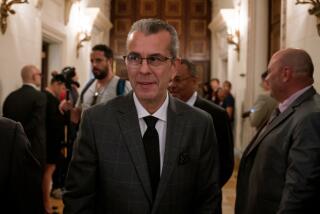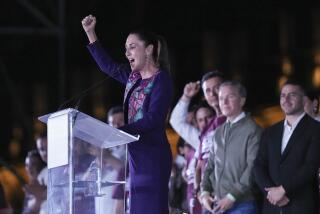In the Philippines, a Political Pollster Doesn’t Wait for Unpopular Answers
- Share via
There has been considerable speculation about who will win the Philippine election tomorrow and about whether the balloting will be conducted honestly. Perhaps the results of a poll I conducted for the Marcos opposition in April of 1978 will shed some light on both questions. Of course, conditions may be different now, but I suspect that some things about the way elections are conducted in dictatorships never change. The opposition (I tend to think of them as the “underground”) had somewhat foolishly entered a slate of candidates in Manila for election to a Consultative Assembly which would write a new Philippine constitution. They seema to have realized too late that the election would almost certainy be rigged in Marcos’s favor. So they persuaded the Roper Organization, where I was a partner, to conduct an independent poll to show that, if the election had been conducted fairly, the opposition slate would have won.
I was first put into conact with the underground in San Francisco where I was shown a photgraph of “Numero Duo,” the operating head of the underground since “Numero Uno” -- the late Benigno Aquino -- was in jail.
After my arival in Manila Numero Duo appeared in my room, accompanied by several very serious young companions. I recognized him immediately but he was suspicious of me. It was just like in the movies. He began to ask me questions like who plays second base for the New York Yankees. I hadn’t the vaguest idea. For the next ten minutes or so, things were fairly sticky but somehow I must have convinced them that I was actually an American pollster. The plan was for me to hold a press conference in Manila on the day before the election in order to reveal our results.
Also, before he left, Numero Duo entrusted to me a piece of paper with a special telephone number on it which I was to use only if my life was in danger. He advised me to commit it to memory and then destroy the piece of paper. It is perhaps saddening to learn in such dramatic fashion that one is, after all, a balding and rather portly middle-aged man rather than the dashing and adventurous figure of one’s fantasy. But even before the committee left my room I had made up my mind to inquire at the American Embassy about the advisability of my continuing with this project. However, the Ambassador was away and the Charge d’Affaires, or whoever, was not immediately available so that by the time I met with the embassy staff, I had progressed beyond the point of no return with the poll. I planned two days of interviewing with a simple questionnaire: a tally of the preference for each position on the slate and an open-ended question explaining why.
Meanwhile, I set about the important business of committing the telephone number to memory. I paced the room repeating the number over and over. Then I flushed the paper down the toilet and got into bed. But almost immediately I began to wonder if I would be able to recall the number. I lept out of bed and rewrote it on another slip of paper. I can recall repeating that same process at least three times. Then I wrote it down in my wallet notebook.
Polling had already begun on the day I finally got to meet with the staff at the embassy. Everyone was extremely polite. They impressed on me their position that The United States government could not be seen to interfere in any way with the election. At one point, I asked if the room was bugged and there was a a short moment of embarrassed silence. I thanked them and left. That evening, one of the gentlemen from the embassy came to my room and told me that the police were going to arrest me.
I dialed the secret number and told Numero Duo that I felt it was foolish to assume that any press conference I held would be accurately reported in the Philippine press -- if it was reported at all. I strongly suggeted that I leave the country immediately and disclose the outcome in America.
Fortunately, they agreed. Early the next morning, several members of the underground arrived to take me to the airport and I asked them if, on the way, we might stop by to learn how the first day’s polling had come out.
The results were startling. Even though only half of the respondents had been questioned, there could be no doubt that the government slate headed by Imelda Marcos was going to win in a landslide. When I informed my sponsors, they screamed at me sometimes in English. I understood them to say that I was a running dog of the fascist conspiracy.
What finally saved the day were the replies people gave when they were asked why they voted the way they did. I don’t know what they said because their comments were written down in tagalog but as the committee read the responses they became more and more morose.
After about an hour, they arrived at two decisions, both of which I think were correct. In the first place, they decided to destroy all the results because, they said, they could be used against the underground if they fell into Marco’s hands. The second decision was to tell no one else about the poll results because that would destroy morale.
I was put aboard the first plane out. The next morning I read in the Tokyo newspapers that a poll had been conducted by the underground and that it showed the underground winning by a large majority. In reality, of course, it was Marcos and Imelda who won overwhelmingly. Most observers at the time reported widespread election fraud. If he was going to win anyway, why then did Marcos bother to rig the results?
I think part of the reason can be explained by the fact that a slate of cadidates was entered by each side. In order to gain more than an even split, Marcos needed to be sure that the least popular members of his own slate gained more votes that the most popular members of the underground slate. And according to our partial results some of the top underground candidates seemed to have a good chance of winning. Another reason had to do with pride. Imelda Marcos, the president’s wife, was at the head of the government slate and it was imperative that she win more votes than any other candidate. And finally, it is possible that Marcos never knew that he was about to win a landslide. I suspect that pollsters in the Philippines don’t ask questions that have answers Ferdinand Marcos doesn’t want to hear.
More to Read
Sign up for Essential California
The most important California stories and recommendations in your inbox every morning.
You may occasionally receive promotional content from the Los Angeles Times.













